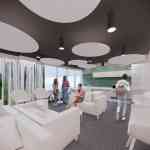Student Residences at the University of Toronto Scarborough
The new Student Residences at the University of Toronto Scarborough will reflect the school's mission of environmental responsibility.
The Student Residences at the University of Toronto Scarborough is at the centerpiece of the northward expansion of the University’s 300-acre campus. Designed to house 718 first-year students, along with supportive resident advisors, the Student Residences will also serve the wider campus with its first full dining hall as well as central offices that serve student life and campus security.
Taking advantage of the natural surroundings, the building has been sited and shaped so that as many occupied spaces as possible feel a connection to the outside. A preserved, historic grove of trees to the north becomes a focal point for common rooms, a large 2nd floor landscaped terrace and the large dining hall at ground level.


Dormitory rooms are arranged in clusters or “communities,” each having their own identity, and are all designed to create a strong sense of home.
The sculpted nature of the building’s form was driven by this concept of student communities. Each community is afforded private study spaces, gathering spaces and a common kitchen for planned or impromptu interactions.


The new Student Residences are designed to be Passive House, the most rigorous sustainability standard in the world.
This method of construction can reduce energy use by 70-80% while improving indoor daily air quality and thermal comfort. The high-performance building envelope incorporates a vertically patterned aluminum cladding system. This textured, dynamic pattern diffuses the repetitious grid of windows that would otherwise define the character of the building. The earthy tones were inspired by and are evocative of Scarborough’s regional geography.

Double-story layering reduces the apparent verticality of the building, enhancing its “fit” into the low-rise neighborhood, and creating an informal domestic feel.
The window size was selected in order to maximize exposure to natural light, while minimizing potential heat loss and maintaining functional operation without sacrificing the layout of the internal spaces.








